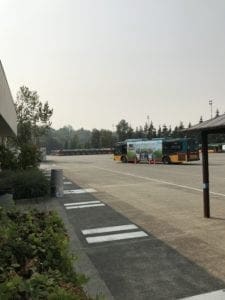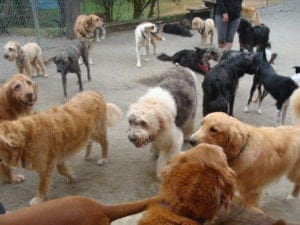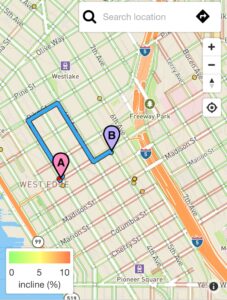Unmute the Commute: The Vanpool
By Gregg Selby
Perhaps you’ve seen them driving around town – those blue and red King County vanpools shuttling groups of commuters to and from work. Metro has the largest vanpool system in the country. Which keeps cars off the road; cutting congestion, reducing greenhouse gas emissions and freeing up riders to play trivial pursuit or sing karaoke.
Amber Cox gets into a vanpool heading from Kent to the Lynnwood Park and Ride. It’s a trip she makes three or four days a week – from the REI headquarters where she works to her home in Mountlake Terrace. The commute is around 30 miles one way and she’s been doing it for over a decade.
And she’s not the only one at REI who takes a vanpool like this one – it’s part of the company culture.
“Everybody knows who’s on vanpools,” she says. “What time your vanpool changes or what time it leaves and if you’re sitting in a meeting and they know you’re supposed to leave, somebody else will say, ‘isn’t your vanpool leaving? Shouldn’t you be going right now?”
Today, Cox’s van is sitting in a half-mile backup waiting to merge from State Route 167 onto I-405, in Renton. Congestion is a given and Cox would rather be sitting in traffic in this van than in a car alone. One reason why: the cost. I ask Cox how much she saves annually from vanpooling.
“Well, I keep track of my mileage,” she says. “And I know it’s 12,000 miles a year that I save off my car.” Cox is the bookkeeper for her vanpool, so she tracks ridership, mileage and fares. The cost of a vanpool is based on the size of the vehicle, the number of passengers and the average daily mileage. For Cox, the vanpool costs her about a $1000 a year – and her employer pays half of that. She’s been riding in her vanpool for over a decade, but the program has been around a lot longer than that.
“Well, King County Metro owns and operates the largest, longest-running commuter van program in the nation,” says Victoria Tobin, the Rideshare Coordinator at King County Metro. “We’ve been around for about 40 years. We started with a small fleet of 21 vans in 1979 and we launched the first public van pools in this country.”
Today there are around 1,600 commuter vans, carrying more than 10,000 commuters. Cities like San Diego, Houston and Los Angeles also have vanpool services, but King County’s program is the largest in the country.
“Each year we estimate we reduce 48 million vehicle miles traveled,” says Tobin. “Which saves more than 2 million gallons of fuel. We also estimate that it prevents 50 million pounds of greenhouse gas from entering the atmosphere. That’s about 22,000 metric tons. So, that’s a lot.”
And then there’s the social aspect. Everyone in Cox’s vanpool works at REI and they spend about two hours a day commuting together. On snow days or in bad traffic, it can be as much as three hours. So, they’ve learned to entertain themselves on the ride.
“We spend a lot of time together,” says Cox. “Sometimes, more than you spend with your family. We like to say that we solve world problems one commute at a time, because it is a long commute.”
The vanpool plays Trivial Pursuit, watches movies and sings karaoke.
“We take people’s phones or whatever device they have and start going through their playlists and just picking their favorite songs or their most played songs,” says Cox about karaoke. “And generally people just join in singing and perhaps there’s arm movements. I’m sure the commuters next to us think we’re crazy.”
Which leads Cox to say this:
“The first rule of vanpool is ‘what happens in vanpool, stays in vanpool.”
The social connection isn’t limited to commuting. Cox and her vanpool get together outside of the van as well. “We’ve done happy hours,” says Cox. “We’ve done taco Tuesdays. One year we did a get together at Christmas where we invited all the friends and family, so we could meet the people we talk about. We’ve done bridal showers, baby showers, parties at people’s houses.”
And so, a little over an hour after starting out, we arrive at the Lynnwood Park and Ride, where the vanpool will meet in the morning for another commute and maybe some karaoke, too.
Unmute the Commute is supported in part by Just One Trip – a King County Metro campaign to get you out of your car starting with just one trip.
Unmute the Commute: The Bus Roadeo
When you think rodeos, bucking broncos or steer wrestling may come to mind, but what about parallel parking and judgement stops? Tammy Klein is a King County Metro bus operator and right now, she is navigating a bus through a series of cones in paved lot behind Metro’s training center in Tukwila. She’s training for a bus roadeo.
Klein seems in her element behind the big steering wheel of this bus. In fact, she waits all year for this moment.
“I am very competitive, and I love to play games, so I always want to win,” she says.
Klein is training for the state bus roadeo. It’s sort of like the Olympics of public transit, with different agencies from around the state sending bus operators and mechanics to compete against one another in timed events. The winners will go on to the International Bus Roadeo, which, next year, is in Louisville, Kentucky.
Tammy Klein will represent King County Metro at the state competition – she received this honor after winning the roadeo for the transit agency, something she has done seven time before.
Seen from a distance, a bus roadeo run doesn’t look very impressive – it’s just a bus moving around some cones in an empty parking lot. But inside the bus, you can see the difficulty it takes to maneuver a big piece of machinery forward and backwards through impossibly tight spaces. Then, there is the final obstacle — the judgement stop, Where Klein accelerates towards and then attempts to stop within six inches of a single cone.
The roadeo is meant as a training exercise for bus operators. It helps them practice maneuvering and just getting used to driving a bus. It is also a chance to acknowledge some of the state’s best drivers and mechanics.
“I think that the bus roadeo is a great way to build the element of a competition with a training element and skill,” says Justin Leighton, executive director of the Washington State Transit Association – a trade group that puts the event on. “Really honing in [on] that skillset of being a driver, working in a maintenance facility.”
The state bus roadeo started over 30 years ago. Originally, it was just for bus drivers but the mechanics competition was added in the 1990s. In that event, a team of three mechanics try to fix different parts of a bus that judges have put bugs in. Fixing a bus is something normally done in a transit agency’s shop, the roadeo is a chance to showcase skills to other.
Klein says its gotten her used to driving a bus.
“It helps you with the safety issues of this big machine that is around fragile people,” she says. “To me, it makes the bus I’m driving — [it] makes me feel like it’s my second skin.”
It can also be motivation. It’s one of her favorite parts of the job. Originally, she wanted to be a truck driver but couldn’t with her schedule. Through a chance encounter, she became a bus operator for King County, and, during her initial training looked out at this roadeo course “and right from the get go, it was like, wow, I want to do that,” she says.
But, it wasn’t that easy – it took Klein 10 years to win her first King County Metro roadeo.
“And I would practice, every year, get better and better and finally just happened to be there – did a good score where other competitors just made a little bit more errors than I did,” she says. “The roadeo is once a year. You don’t make it – it’s 364 more days.”
And so, she keeps practicing and she does it on her own time. She’ll take days off work and spend them running the course over and over again – sometimes for 48 hours a week. The bus operator roadeo also consists of a precheck – basically, the driver checks the bus for mechanical problems or safety issues– and a uniform inspection. For this, Klein has an extra uniform that she leaves in her closet all year so it stays clean.
But, in the six years of going to state, winning has proven elusive.
She’s hoping her persistence pays off, but, until then, she’ll just enjoy driving.
“I like driving, and the bus, it’s like a challenge,” she says. “I like challenges. I like driving a car, I like driving a bus, I commute on my motorcycle every day – I just like driving. And I get paid for it. I’m like really?”
Produced by Hans Anderson
Unmute the Commute is supported in part by Just One Trip – a King County Metro campaign to get you out of your car starting with just one trip.
Unmute the Commute: The Canine Commute
The Puget Sound region has grown quickly over the last 10 years. That means thousands more people are in cars headed to work. But there’s another population also sitting in traffic: dogs.
Bruno is one of those dogs sitting in traffic.
“Bruno is a dog that probably we should have called Clifford,” says Sydney Calvo – Bruno’s self-described dog guardian. “He’s not red, but sort of chocolate brown. He is probably the largest lab you may have seen in a while.”
Bruno’s day usually involves walking along the Puget Sound waterfront and cruising around with the family. Though, several times a week, he goes from his home in West Seattle to a doggie daycare 45 minutes to the southeast in Ravensdale, WA.
A dog shuttle picks Bruno up at 10 AM and takes him to a multi acre, forested property where he plays with other dogs.
Robert and Tiffany Berry own Super Fun Happy Dog, which runs this service. The couple started the business in 2001. At first, they were dog walkers in Seattle. But, in 2003, they moved out to the Ravensdale property where they could expand their business into what it is today.
“Some of these guys come out five days a week,” says Berry. “So, they know each other, they play together. Everyone has their place in the pack.”
About 50 dogs trot around the outdoor space, sniffing each other and engaging in playful skirmishes. Most of them arrive in white air-conditioned vans like the one Bruno came in.
“We on average have 16 to 17 dogs in each van,” explains Berry. “You’ve got to figure that on a daily basis there’s at least, in Seattle, several hundred dogs being transported around with the various companies.”
In the Seattle area, rates vary for dog daycare from less than $30 per day without shuttle service, to between $30 and $45 per day with shuttle service. In addition to daycare transportation, there are other businesses that take dogs and cats to the vet and the groomer.
“Back when I was younger, it was, you know, have the dog chained up in the backyard, keep them in the garage all day,” Berry says. “And now it’s hydrotherapy for dogs and raw food diets. I mean, these are people’s kids, right?”
Berry has grown close to many of his clients through working with their dogs and he’s been there through important life events.
“We’ve seen their kids grow up, we’ve been there when their parents have died, we’ve been the guys that pick up their dog when they give birth. You know we tell them to pack an emergency backpack for their dog just like they have an emergency backpack for the mom, you know, so we can just swoop in and grab the dog and leave,” he says.
While some dog owners are looking for a place for their pet to run, other city residents like to have their dog close to home. Some tech companies allow dogs in the workplace and badged employees are commonly seen in Seattle’s South Lake Union neighborhood with a dog in tow. There now seems to be a culture built around dogs in the workplace.
“If you come out here at lunch hour, it’s the new cigarette break,” says Elise Vincentini, owner of Downtown Dog Lounge. “It’s a nice healthy one. It’s take your dog out for a walk. It’s really fun to go out around 11 o’clock and see what everybody’s doing.”
At Amazon, there are around 6,000 dogs approved to be on campus. With that many dogs at work, some Amazon employees will seek out help with their pets.
“We offer a shuttle from Capitol Hill and all of the Amazon major locations, and we shuttle dogs from there to our space and then again in the afternoon we shuttle them back home,” says Vincentini. “When you’re urban living, it’s different. We don’t have all the options to run our dogs leash free or on a hike or things like that, so daycare is a necessity for some people.”
So, while their owners go to work, pets are also keeping a full schedule and joining the throngs of commuters making their way across town each day.
Produced by Jennie Cecil-Moore
Unmute the Commute: Seniors’ Health and Public Transit
On today’s Unmute the Commute we look at the relationship between riding public transit and the health of older adults. Produced by Michelle Wallar Martin.
Unmute the Commute: The Access Map
Seattle’s steep hills can make traversing the city difficult for those with limited mobility. But, computer scientists at the University of Washington hope to help with a map that routes people through public elevators and lower grade streets. Today’s story: The Access Map. Produced by Casey Martin and Hans Anderson.
To test out new versions of the Access Map, contact uwtcat@uw.edu.
Unmute the Commute: The Solowheel
“The Future of Commuting” is already here, reads many headlines today. But what does that really look like? Today on Unmute the Commute, we explore one of these futures – that is already a reality in Seattle. Produced by Jennie Cecil-Moore.
Unmute the Commute: The SODO Busway Murals
There’s an art gallery in Seattle only accessible by public transit. Today on Unmute the Commute, the SODO Busway Murals. Produced by Ann Kane.
Unmute the Commute: Angel Flight West
Have you ever wondered how some of our neighbours in outlying islands make it to medical centers quickly when needed? Today on Unmute the Commute, here’s one solution. Produced by Jennie Cecil-Moore.
Unmute the Commute: Cutting the Ferry Line
Unmute the Commute: Get on the Bus! Transit Training
Remember the first time you rode public transit? Think of what your learning curve was like. You may not have known that here in King County, Metro offers training to help flatten that learning curve. Today on Unmute the Commute, Transit Training. Produced by Jennie Cecil-Moore.
Unmute the Commute is supported in part by Just One Trip, a King County Metro campaign to get you out of your car – starting with just one trip.
Additional Resources:




